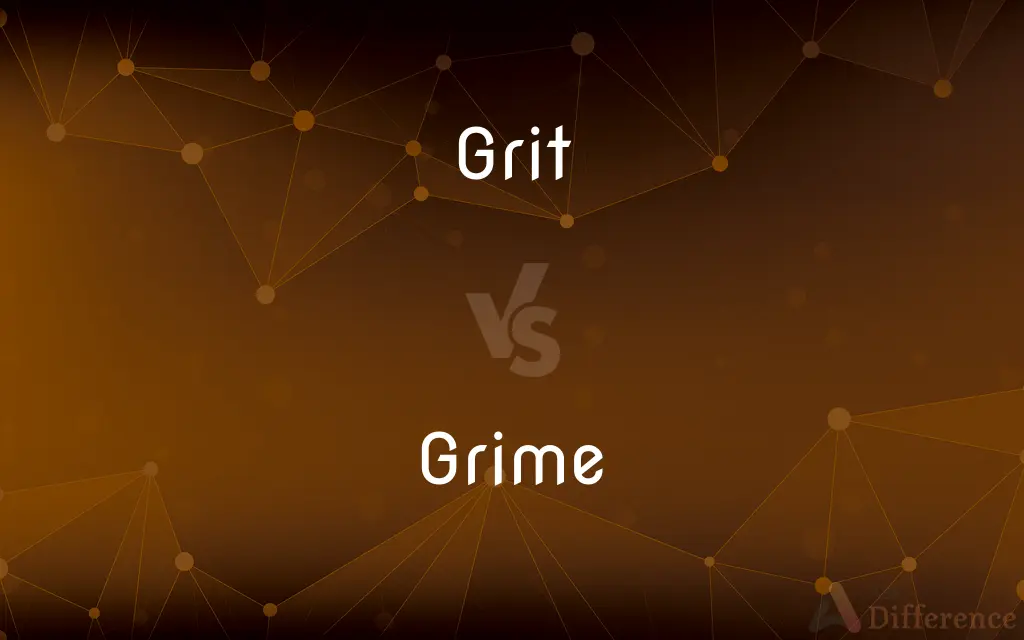Grit vs. Grime — What's the Difference?
Edited by Tayyaba Rehman — By Urooj Arif — Updated on April 16, 2024
Grit refers to small, coarse particles, often of sand or stone, exemplifying perseverance and resilience, whereas grime is a layer of dirt or filth, typically oily or dusty.

Difference Between Grit and Grime
Table of Contents
ADVERTISEMENT
Key Differences
Grit commonly describes small, coarse particles like sand or crushed stone, used in various contexts from construction to descriptions of sandy textures. On the other hand, grime refers to a thick layer of dirt or filth that accumulates on surfaces, often sticky or greasy, making it undesirable in clean environments.
Grit is also used metaphorically to denote courage, resolve, and strength of character, especially in challenging circumstances. Whereas grime lacks such positive connotations and is generally associated with neglect or poor maintenance, emphasizing a need for cleaning or upkeep.
In materials and manufacturing, grit can specify the grade of abrasives used on sandpaper and other surfaces for finishing and smoothing operations. Whereas grime does not play a functional role in processes but is something to be removed from machinery and parts to ensure proper operation.
Environmental impact highlights another distinction; grit can contribute to sedimentation and particulate pollution when not managed properly in industrial outputs. On the other hand, grime can affect air quality and sanitation, particularly in urban settings where it builds up on buildings and streets.
From a maintenance perspective, grit might be added intentionally to surfaces like roads and sidewalks to enhance traction during icy conditions. Whereas grime is something that accumulates unintentionally and usually requires cleaning efforts to restore aesthetics and hygiene.
ADVERTISEMENT
Grit and grime both interact with water differently; grit tends to be washed away or settle depending on the environment, playing a role in natural and artificial landscapes. On the other hand, grime often requires detergents or specialized cleaning agents to be removed, particularly when it forms a residue on fabrics, metals, or other materials.
Lastly, in literature and popular media, grit often symbolizes perseverance and tenacity, a quality admired and seen as essential for overcoming adversity. Grime, however, is frequently used to describe squalid, unappealing conditions, contributing to a setting's atmosphere or a character's troubled state.
Comparison Chart
Definition
Small, coarse particles like sand or stone
Thick layer of dirt or filth, often oily
Connotations
Courage, perseverance
Neglect, need for cleaning
Use in Processes
In abrasives for smoothing surfaces
Unwanted buildup needing removal
Environmental Impact
Can cause sedimentation
Affects air quality, needs cleaning
Interaction with Water
Washed away or settles
Requires detergents to remove
Compare with Definitions
Grit
Coarse particles used in various industrial materials.
The construction site was covered in grit.
Grime
Buildup that requires rigorous cleaning efforts.
Scrubbing the grime off the tiles took hours.
Grit
Personal toughness and tenacity.
Her grit was evident in her determination to finish the marathon.
Grime
Associated with urban pollution.
The city's buildings were layered in urban grime.
Grit
Material added to surfaces for traction.
Grit was spread on the snowy road to prevent accidents.
Grime
Layer of dirt adhering to surfaces.
The old bookcase was coated in grime.
Grit
Small, hard particles in food or other substances.
The grit in his spinach salad was unpleasant.
Grime
Symbolic of neglect or poor conditions.
The grime on the windows obscured the view.
Grit
A measure of coarseness in sandpapers and abrasives.
He chose a high-grit paper for the finishing touches.
Grime
Oily or sooty dirt found in industrial areas.
His hands were blackened with the grime of the workshop.
Grit
Small loose particles of stone or sand
She had a bit of grit in her eye
Grime
Dirt ingrained on the surface of something
The windows were thick with grime
Grit
Courage and resolve; strength of character
I've known few men who could match Maude's grit
Grime
A genre of popular music influenced by UK garage, typically characterized by a minimal, prominent rhythm, a very low-pitched bassline, and vocals by an MC.
Grit
Spread grit and often salt on (an icy road)
The main roads in Plymouth will be gritted from 6.30 p.m. tonight
A council gritting lorry
Grime
Blacken or make dirty with grime
The windows were grimed like a coal miner's goggles
Grit
Grate
Fine red dust that gritted between the teeth
Grime
Black dirt or soot, especially such dirt clinging to or ingrained in a surface.
Grit
Minute rough granules, as of sand or stone.
Grime
To cover with black dirt or soot; begrime.
Grit
The texture or fineness of sand or stone used in grinding.
Grime
Dirt, grease, soot, etc. that is ingrained and difficult to remove.
Underneath all that soot, dirt and grime is the true beauty of the church in soft shades of sandstone.
Grit
A coarse hard sandstone used for making grindstones and millstones.
Grime
(music) A genre of urban music that emerged in London, England, in the early 2000s, primarily a development of UK garage, dancehall, and hip hop.
Grit
(Informal) Indomitable spirit; pluck.
Grime
To begrime; to cake with dirt.
Grit
To clamp (the teeth) together.
Grime
Foul matter; dirt, rubbed in; sullying blackness, deeply ingrained.
Grit
To cover or treat with grit.
Grime
To sully or soil deeply; to dirt.
Grit
To make a grinding noise.
Grime
The state of being covered with unclean things
Grit
A collection of hard small materials, such as dirt, ground stone, debris from sandblasting or other such grinding, or swarf from metalworking.
The flower beds were white with grit from sand blasting the flagstone walkways.
Grime
Make soiled, filthy, or dirty;
Don't soil your clothes when you play outside!
Grit
Sand or a sand–salt mixture spread on wet and, especially, icy roads and footpaths to improve traction.
Grit
Inedible particles in food.
These cookies seem to have grit from nutshells in them.
Grit
A measure of the relative coarseness of an abrasive material such as sandpaper, the smaller the number the coarser the abrasive.
I need a sheet of 100 grit sandpaper.
Grit
(geology) A hard, coarse-grained siliceous sandstone; gritstone. Also, a finer sharp-grained sandstone, e.g., grindstone grit.
Grit
Strength of mind; great courage or fearlessness; fortitude.
That kid with the cast on his arm has the grit to play dodgeball.
Grit
Husked but unground oats.
Grit
Coarsely ground corn or hominy used as porridge.
Grit
Apparently only in grit one's teeth: to clench, particularly in reaction to pain or anger.
We had no choice but to grit our teeth and get on with it.
He has a sleeping disorder and grits his teeth.
Grit
To cover with grit.
Grit
To give forth a grating sound, like sand under the feet; to grate; to grind.
Grit
Sand or gravel; rough, hard particles.
Grit
The coarse part of meal.
Grit
Grain, esp. oats or wheat, hulled and coarsely ground; in high milling, fragments of cracked wheat smaller than groats.
Grit
A hard, coarse-grained siliceous sandstone; as, millstone grit; - called also gritrock and gritstone. The name is also applied to a finer sharp-grained sandstone; as, grindstone grit.
Grit
Structure, as adapted to grind or sharpen; as, a hone of good grit.
Grit
Firmness of mind; invincible spirit; unyielding courage; fortitude.
Grit
To give forth a grating sound, as sand under the feet; to grate; to grind.
The sanded floor that grits beneath the tread.
Grit
To grind; to rub harshly together; to grate; as, to grit the teeth.
Grit
A hard coarse-grained siliceous sandstone
Grit
Fortitude and determination;
He didn't have the guts to try it
Grit
Cover with a grit;
Grit roads
Grit
Clench together;
Grit one's teeth
Common Curiosities
Why is grime problematic?
Grime can degrade environmental aesthetics and hygiene, requiring significant cleaning efforts.
What is grit made of?
Grit is primarily made up of small, coarse particles such as sand or crushed stone.
How is grime formed?
Grime forms from the accumulation of dirt, oil, and pollutants, especially in areas with high traffic or industrial activity.
Can grit be beneficial?
Yes, grit is used to provide traction on icy roads and as an abrasive in industrial applications.
What does grime signify in films or books?
Grime typically signifies decay, neglect, or the dark aspects of an environment or situation.
How can grime affect health?
Grime can harbor bacteria and contribute to poor air quality, impacting respiratory health.
What kind of surfaces does grime accumulate on?
Grime can accumulate on almost any surface, especially those exposed to pollution and insufficient cleaning.
Is there an environmental impact of grit?
Yes, mismanaged grit can contribute to sedimentation and particulate pollution.
What are the negative implications of grime?
Grime generally has negative implications, indicating dirtiness and the need for cleaning.
What is the symbolic meaning of grit in literature?
In literature, grit often symbolizes perseverance and resilience in the face of adversity.
Is there a way to prevent grime buildup?
Regular cleaning and maintenance are key to preventing grime buildup on surfaces.
Can grit size vary?
Yes, grit sizes vary and are categorized by their coarseness, impacting their use in different applications.
Does grit have positive or negative connotations?
Grit has positive connotations, often associated with personal strength and resilience.
How do you effectively remove grime?
Effective removal of grime often requires detergents, scrubbing, and sometimes specialized cleaning solutions.
How do industries handle grit?
Industries use grit in processes like sandblasting and also manage its disposal to minimize environmental impact.
Share Your Discovery

Previous Comparison
Lecturer vs. Lecture
Next Comparison
Ava vs. AbaAuthor Spotlight
Written by
Urooj ArifUrooj is a skilled content writer at Ask Difference, known for her exceptional ability to simplify complex topics into engaging and informative content. With a passion for research and a flair for clear, concise writing, she consistently delivers articles that resonate with our diverse audience.
Edited by
Tayyaba RehmanTayyaba Rehman is a distinguished writer, currently serving as a primary contributor to askdifference.com. As a researcher in semantics and etymology, Tayyaba's passion for the complexity of languages and their distinctions has found a perfect home on the platform. Tayyaba delves into the intricacies of language, distinguishing between commonly confused words and phrases, thereby providing clarity for readers worldwide.
















































